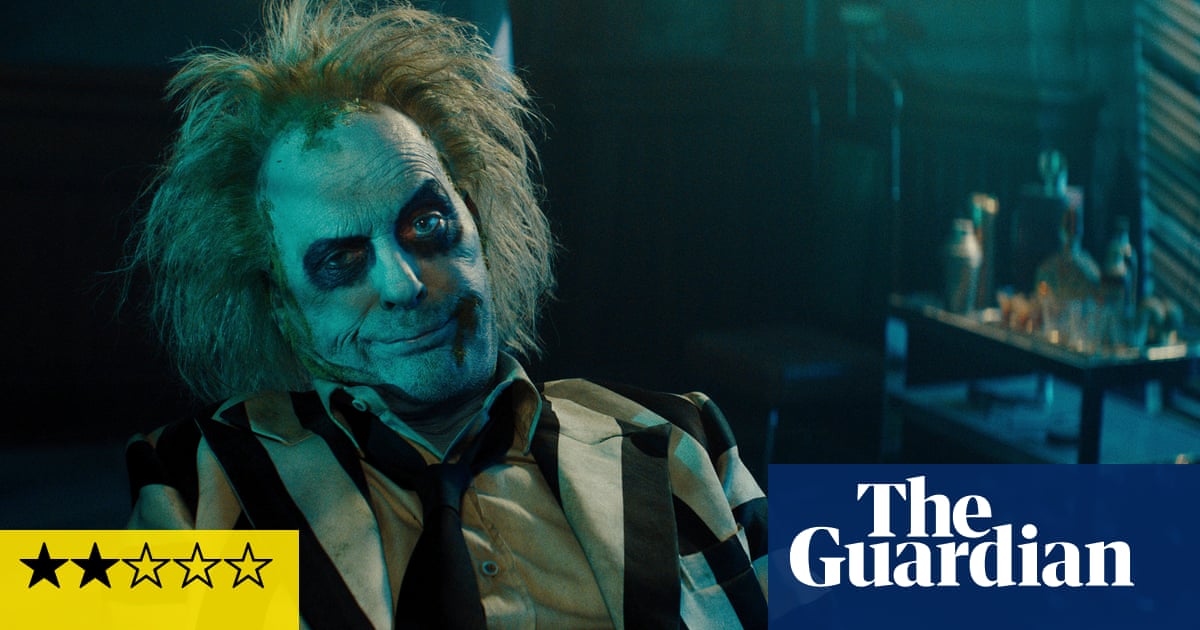The Venice film festival, the oldest event on the circuit, likes to make the most of its past, with vintage stills in the lobby and antique retrospectives in the smaller theatres. Away from the main programme it is a veritable ghost town, a bubbling afterlife of cinematic history. On rare occasions, its spectres gatecrash the red carpet as well. Tim Burton’s Beetlejuice Beetlejuice, the opening film of the 81st edition, is a game attempt to reanimate the bones of the director’s beloved 1988 horror-comedy, even if its line in shock tactics feel a trifle worn this time around, like something plucked from the rack of a small-town thrift shop. The hyperventilating plot doesn’t help matters. In spinning his tale of the living and the dead, Burton throws in sandworms and showtunes and a soul train to the great beyond, perhaps reasoning that if one gaudy set-piece doesn’t snag our attention, have no fear: there will be another, just as gaudy, 30 seconds down the line.
Winona Ryder reprises her role as Lydia Deetz, the plucky goth heroine from the original picture. Lydia is now a middle-aged psychic, flushed with the success of a tacky TV show but saddled with a fiance called Rory (Justin Theroux), whose man bun and new age blather immediately signify that he’s a wrong ’un. Revisiting her home town of Winter River for Halloween, Lydia is taunted by reminders of that old trickster demon (Michael Keaton), and desperately toils to safeguard her family. “If you say his name three times, he appears,” she warns. Rory, the doofus, promptly obliges. He does so, he says, because he is into trauma therapy.
Keaton himself is one of the more superfluous acts in this retro circus, on hand to introduce the film’s hand-tooled effects and strongarm the plot twists. He is running scared from his soul-sucking ex-wife (Monica Bellucci), and pursued through the afterlife by Willem Dafoe’s hard-boiled ghost detective. But he remains a mothballed, one-note presence, a series of wisecracks in search of a point. Perhaps that’s the consequence of patrolling the spirit world for more than 600 years. After a while, any job is bound to lose its thrill.
Beetlejuice Beetlejuice beats back to the scene of past triumphs. It’s once, twice, three times a lazily amiable horror sequel; a makeweight festival opener that provides little beyond its arrangement of chintzy American Gothic. What fresh timber there is comes courtesy of a sparky subplot involving Lydia’s rebellious daughter Astrid, who is played with just the right note of soulful sullenness by Jenna Ortega. Rattling around Winter River, Astrid meets a sensitive local ghost called Jeremy, who is still haunting the tree he fell out of as a teen. Astrid longs to reconnect with her cherished dead dad; Jeremy, for his part, reckons he can help. And it is in these scenes, in the subterranean ticket office by the soul train, that one catches glimpses of the vibrant, vital film that this might have been.
Burton’s 1988 original was the director’s big breakthrough, indirectly paving the way for Batman, Ed Wood and Charlie and the Chocolate Factory. Since then, Beetlejuice has been repurposed as a TV cartoon, a video game and a flop Broadway musical, which presumably qualifies it as a franchise of sorts. But this long-time-coming sequel doesn’t add much to the myth, nor push the tale in any radical new direction. For all its spilling intestines and head-spinning demon babies, Beetlejuice Beetlejuice feels underpowered and throwaway. It’s a likable exercise in nostalgia; a joyride through old haunts. Burton’s underworld caper contains plenty of second-hand spirit; what it craves is fresh blood. What it needs is some substance.
after newsletter promotion

